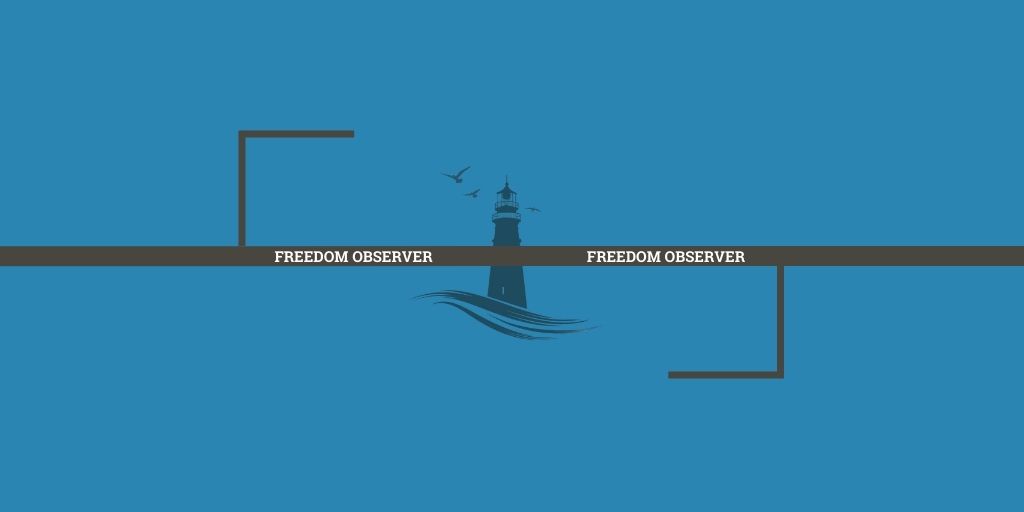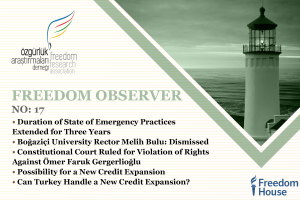
Editörden,
We can perhaps make the most accurate assessment of the state of Turkish politics by looking at the final decision of the Supreme Election Board (YSK), just a short while before the general elections. With this decision, the YSK has rejected the objections made to President Tayyip Erdoğan’s candidacy for the presidency for the third time. However, Article 101 of the Constitution is clear that, as a rule, a person can be elected president “at most twice”. The only exception to this is the provision in Article 116 of the Constitution, which allows the incumbent president to be a candidate for the third time in case the parliament decides to renew the elections. However, the decision that led Turkey to the early elections was taken by President Erdogan, not the Grand National Assembly of Turkey.
This is the last in a series of decisions that the YSK has made in recent years, unlawfully favoring the AKP and its leader. As will be remembered, the YSK accepted “unsealed votes” as valid in the 2017 Constitutional referendum, contrary to its established jurisprudence; In 2019, YSK canceled the election of the Istanbul Metropolitan Municipality, which was won by CHP candidate Ekrem İmamoğlu. It seems that this time the YSK did not hesitate to decide in favor of the ruling party, even at the expense of violating the Constitution.
Recently, there has been another important development not only in terms of damaging the freedom and fairness of the election campaign but also in terms of revealing the pathetic situation in which the rule of law and the independence of the judiciary have fallen in Turkey: Upon the Constitutional Court’s unblocking of HDP’s bank accounts, the news that some members of the high court were called by the President by phone and almost questioned, fell on the media. If true, this news, unfortunately, confirms widespread public concerns that the President, when appointing members to the Constitutional Court, prefers people whom he is sure will act in line with his policy, thus aiming to “encircle” the high court.
Meanwhile, HDP’s request to postpone its oral defense, which was decided by the Constitutional Court to be held at a date during the campaign period, after the election was rejected by the court. This led to the HDP’s decision to enter the elections under the umbrella of another party, which was concerned about the possibility of being shut down before the parliamentary elections to be held on May 14. It is clear that this decision of the Constitutional Court, which creates uncertainty for the HDP, is a development that will adversely affect the health of the election campaign.
The oppressive practices of the AKP-MHP administration are of course not limited to the right to fair and democratic elections and the independence of the judiciary. Intense pressure and restrictions on freedom of media and communication indeed continue at an unprecedented level. As a matter of fact, the findings in ‘Turkey in the Media and Press Freedom Report for 2022,’ recently announced by the European Center for Press and Media Freedom, are quite disappointing. The report records many cases of systematic crackdowns on independent media, most of which we already know. According to the report, Turkey is unfortunately one of the countries that imprison journalists the most, as there were 41 journalists in prison at the time the report was published. Many journalists in Turkey face arrest and prosecution, especially those who report critically about the AKP-MHP government and its supporters. The Kurdish media takes the biggest share from the state and government pressure on the media.
These developments, which created doubts about the fairness of the election campaign, were accompanied by another development that undermined the security of the campaign: There were reports of an armed attack on the Iyi Party Istanbul Provincial Presidency building. The police made a statement that this was not an attack on the party building, but an unlikely event that the guard of the construction opposite the building had to open fire in that direction to scare the thieves. However, the persuasiveness of the police statement weakens when it is remembered that the decision of the İYİ Party to return to the opposition bloc after a short crisis in early March has greatly disturbed the ruling parties.
While all this is going on, there is no sign of a positive change in the economic policy that creates the livelihood problems that the people are exposed to in their daily lives. In the meantime, it is unclear to what extent the recent decision to remove the upper limit on interest rates on “FX-Protected Deposits” will stop the rise of the dollar and return to the Turkish lira. In addition, the artificial relief created by the populist “election economy”, which the government has been implementing for a while, does not mean that the economic crisis of society, in general, has disappeared. Nor does it mean that the economic crisis has come to an end. The cost of this policy in the medium and long term will fall on the political team (most likely, the “Table for Six”) that will control the executive after the elections.
In the past, it was as if election campaigns had a sweet excitement and joy for everyone. Probably since the campaign coincided with the month of Ramadan, unfortunately this time it is not so.
I hope we will prepare the next Bulletin in a more pleasant environment. Stay tuned.
* Prof. Dr. Mustafa Erdoğan
The Allegation that the President Called the Members of the Constitutional Court
In her news dated March 30, 2023, Seyhan Avşar from Halk TV revealed some allegations that she stated were based on the statements of a member of the Constitutional Court. In the news, it is stated that after the Constitutional Court decided to lift the measure regarding the blocking of HDP’s accounts, the President called the members who voted for the measure to be lifted and expressed his discomfort with the decision.
Within the scope of the lawsuit regarding the closure of the Peoples’ Democratic Party pending in the Constitutional Court, the Chief Public Prosecutor’s Office of the Supreme Court requested that the bank account to which the party’s aid received from the treasury was being blocked, and the Constitutional Court gave the injunction to block the account on 5 January.[1] This decision was taken by the votes of 9 members, while 6 members objected. Evaluating the application made by the party for the annulment of this injunction, the Court decided to revoke the injunction on March 9, 2023, after receiving the defense of the defendant party.[2] This decision was made by the majority of 8 members, despite the opposition of 7 members. Between these two decisions, it is understood that the two members changed their minds. It is understood that the explanations in the said news belong to one of these members.
According to the news, after the decision to lift the measure, the President called the members who voted to lift the measure and said, “I trusted you a lot. How do you vote to unblock accounts?” asked. There was no denial about this news. If the news is true, there is no doubt that the questioning of a high judge by the head of the executive body constitutes an intervention in the judiciary. The fact that such intervention takes place in an ongoing party closure case further increases the gravity of the situation. Because the decision to close a party while approaching the elections has the potential to affect the results of the election.
One of the basic principles of the rule of law is the independence of the judiciary. In a country where the judiciary is not independent, the rule of law is emptied its meaning. The principle of equality before the law becomes inapplicable. In a place where the judiciary is not independent, the law and the judiciary cannot guarantee of rights and justice, on the contrary, they become instruments of arbitrariness and tyranny.
Although the independence of the judiciary has always been problematic in Turkey, it has been expressed by all independent observers that the most fundamental problem facing the erosion of the rule of law in the last decade is the interference with the structural independence of the judiciary. The structural independence of the judiciary vis-à-vis the executive has been seriously weakened as a result of numerous constitutional and legal changes to the structure of the Council of the Judiciary (HSK) and high courts, the dismissal of one-third of the existing judges after the coup attempt, and the easing of conditions for the appointment of the large number of new judges.
However, this news shows that the problem is not only structural but also that there may be direct interventions against judges and decisions. Such interventions not only lead to unjust decisions but also have political consequences. Controversial decisions, such as the cancellation of the Istanbul Metropolitan Municipality election given by the Supreme Election Board in the past, and the validation of unsealed votes in the Constitutional referendum, also had political consequences. During the election process, the Supreme Election Board will make decisions on critical issues such as whether Erdoğan will be a candidate for the third time, and whether the ministers can become a parliamentary candidates without resigning. Decisions must be free from any suspicion of interference. Such doubt makes democratic legitimacy questionable.
Statements by a supreme judge that he was questioned by the executive for his decision are of historical significance. If these allegations are investigated and determined to be true, legal processes should be initiated.
* Ali Rıza Çoban – Constitutional Lawyer
Constitutional Court Rejects HDP’s Request for Postponement of Oral Defense
The party’s oral defense, which was decided to be held on March 14, was postponed to April 11 due to the earthquake. Thereupon, HDP applied to postpone the oral defense to a date after the election, that is, after 14 May. In the application, it was stated that “the risk and threat of closure after the submission and finalization of the lists will create irreparable or impossible consequences for the Party” and that after a possible closure decision, the Party will lose its right to participate in the elections and the right of deputies to be elected will be taken away. While awaiting the decision of the Constitutional Court, HDP made attempts to enter the elections from the lists of the Greens and Left Future Party in order not to be out of the vote due to a possible closure case before the May 14 elections and was waiting for the final decision of the Constitutional Court.
Last week, the Constitutional Court gave its decision on the HDP’s application. In the statement made by the Constitutional Court, it was stated that “the request for the postponement to a date after the general election of the Grand National Assembly of Turkey and the Presidential elections announced by the Supreme Election Council was rejected unanimously on 22/3/2023“. Although the Constitutional Court was expected to decide in this direction, this decision proved that the Constitutional Court damaged the fair and competitive nature of democratic elections. In other words, regardless of the content of the closure case, the AYM’s refusal of HDP’s request to leave the oral defense until after the election is contrary to the requirements of the democratic political order. It is unacceptable in a democratic country that parties are worried about being shut down shortly before the elections and their politicians are threatened with a political ban. One of the primary conditions for the elections to be held in a fair process and for legal security is the elimination of “judicial” concerns about arbitrarily removing political parties from the competition.
* Ömer Faruk Şen – Ph.D. – Missouri University
Media and Press Freedom Violations Monitoring Report 2022
In a report published by the International Press Institute (IPI), the European Federation of Journalists (EFJ), and the European Center for Press and Media Freedom (ECPMF) as part of a joint Media Freedom Emergency Response (MFRR) project that monitors and supports threatened journalists, media workers, and platforms, it seems that there are data on press and media freedom in Turkey that are not at all optimistic.
According to the report, 2022 has been a devastating year for press freedom in Turkey, where the systematic repression of independent media continues. MapMF recorded a total of 167 press freedom violations in Turkey, involving 362 individuals or media outlets. Turkey continues to be one of the countries that imprison journalists the most in the world. At the time the report was published, 41 journalists were in prison.
Journalists who cover critically about the AKP face threats of arrest and prosecution. Meanwhile, increasing physical attacks on journalists add to a hostile and dangerous work environment. Kurdish media, in particular, face great pressure due to both their journalistic activities and their ethnic origins.
Güngör Arslan, owner and editor-in-chief of the local newspaper “Ses Kocaeli”, was shot dead in front of his office in February. Arslan wrote articles criticizing the former Kocaeli Provincial Head of Ülkü Ocakları, Ersin Kurt, who is said to have ordered the murder to silence him.
More than half of the documented cases (53.3%, 89 violations) that aim to silence the independent media and critical journalists are harassed through using the law in an arbitrary manner. Arbitrary detentions, prison sentences, deportations, and police raids account for about a quarter (24.0%, 40 violations) of documented cases in Turkey.
13.2% of the violations recorded consisted of judicial convictions (22 violations) including different terrorism charges. Journalists have also been regularly subjected to harassment campaigns and received physical violence and death threats online.
Another major blow to press freedom came last October when the Turkish Grand National Assembly passed a comprehensive new law that would face up to three years in prison for those accused of spreading disinformation. As part of the same package law, internet news portals were recognized as the official news media, and these portals were also required to publish “corrections” issued by the authorities. In addition, a regulation entitled “Ethics of the Press”, which came into effect in July will particularly influence news about LGBTIQ+ by allowing it to censor media content based on “morality”.
Meanwhile, the government-controlled Radio and Television Supreme Council (RTÜK) continued to impose discriminatory sanctions on media outlets and block access to websites. Courts have decided to block access to hundreds of news stories. After the bomb attack in Istanbul in November, Turkish authorities decided to ban broadcasting and restricted access to social media.
Journalists in Turkey were subjected to physical violence, mostly by the police (66 targeted journalists and 21 cases) while covering protests. About two-thirds (63.6%) of such cases of physical violence (33 violations) recorded on MapMF were perpetrated by state security forces. Meanwhile, female journalists were also sexually assaulted and harassed by the police.
* Gürkan Özturan – European Centre for Press and Media Freedom Media Freedom Rapid Response Coordinator
The Government’s Test with Dollar Continues
With a decision taken by President Erdoğan and published in the Official Gazette on March 31, 2023, the interest limit applied to Currency Protected Deposit accounts was abolished. This decision also shows that other regulations will come to prevent the sudden rise of the exchange rate towards the election.
First of all, we need to remember the past. As you have read in these bulletins before, the government introduced a banking product called “Currency Protected Deposits” to protect the value of the Turkish Lira and made it mandatory for all banks to offer this product to their customers. On December 20, 2021, Erdoğan said at the exit of a cabinet meeting, “There will be no need for any of our citizens to switch their deposits from Turkish lira to foreign currency because ‘the exchange rate will be higher’. He explained the Currency Protected Deposit (KKM) product by saying, “If the Turkish lira deposit income remains below the exchange rate, the difference will be paid.”[1] The US dollar, which was traded at 18.43 that day, fell to 13 TL after the announcement. As a result of this statement, many people favored the KKM accounts. However, over time, the decline in the exchange rate reversed and the American dollar started to rise again. As a matter of fact, as of March 31, USD is traded at 19.48 levels.
First of all, it is useful to know the following fact: One of the most important indicators affecting the economic voting behavior of the electorate in Turkey is the situation of the Turkish lira against the dollar. In addition, unemployment data also affect voting behavior. Although it may seem a little strange that the inflation rate does not have as much effect on voting behavior as these two data, this is the case. It is clear that this is due to the fact that we are a country that has historically experienced a savings deficit. In addition, the economy is highly dollarized, as confidence in the Turkish lira is highly eroded. Dollarization is accelerating as confidence in the Turkish Lira has decreased and the Turkish Lira has almost ceased to be a savings instrument due to suppressed deposit rates. Knowing this, the Erdogan government is making a special effort to keep the dollar’s value at a certain point before the election.
This system, which is called the Presidential Government System, centralized everything. Imagine that such a technical decision enters our lives with the signature of the President. Neither savers nor service providers are consulted when making these decisions. It is not even clear what kind of arrangement this is. The type of this decision is a “Presidential Decree”, that is, not a law, not a regulation, not a circular. At the moment, you can find a “Presidential Decree” about any issue in the Republic of Turkey. This is both an important example in terms of democratic decay and one of the most important reasons for economic regression. In addition, the number of these changes made with the “Presidential Decrees” is not clear. Because first, a change is made, then the details of that change are explained verbally, and then that statement is published as the “Presidential Decree”. Even professional bankers have a hard time keeping up with these rapid changes.
We can discuss at length the reasons why the USD/TRY rate has come to this point. Economic developments do not any longer appear as the cause of our problems but of political turmoil. For this reason, we often talk about the political situation and legal predictability rather than technical data. In the next bulletin, we will talk about the future reflections of the burden brought by the KKM to the Treasury, and that the Central Bank’s reserves decreased to -41 billion dollars when the swaps were removed.
* Enes Özkan – Economist, Istanbul University
[1] https://halktv.com.tr/siyaset/erdogan-hdp-kararinin-ardindan-telefona-sarildi-iste-o-konusma-727804h
[2] https://www.anayasa.gov.tr/media/8438/2021-2-spk-ara-karar.pdf
[3] https://www.anayasa.gov.tr/media/8594/2021-2_spk_ara_karar-9_3_2023.pdf
[4] https://www.mapmf.org/explorer?f.year=2022&f.country=Turkey. Proje Avrupa Komisyonu tarafından finanse edilmektedir. Geçmiş raporlar MapMF web sitesinden indirilebilir ve bu rapor için uyarılara, sürekli güncellenen ve izleme ortakları tarafından belgelenen tüm uyarıları toplayan ve görselleştiren Uyarı Gezgini aracılığıyla erişilebilir.
[5] https://www.resmigazete.gov.tr/eskiler/2023/03/20230331-15.pdf
[6] https://tr.euronews.com/2021/12/20/cumhurbaskan-erdogan-dan-turk-liras-mevduatlar-icin-yeni-duzenleme-ac-klamas





